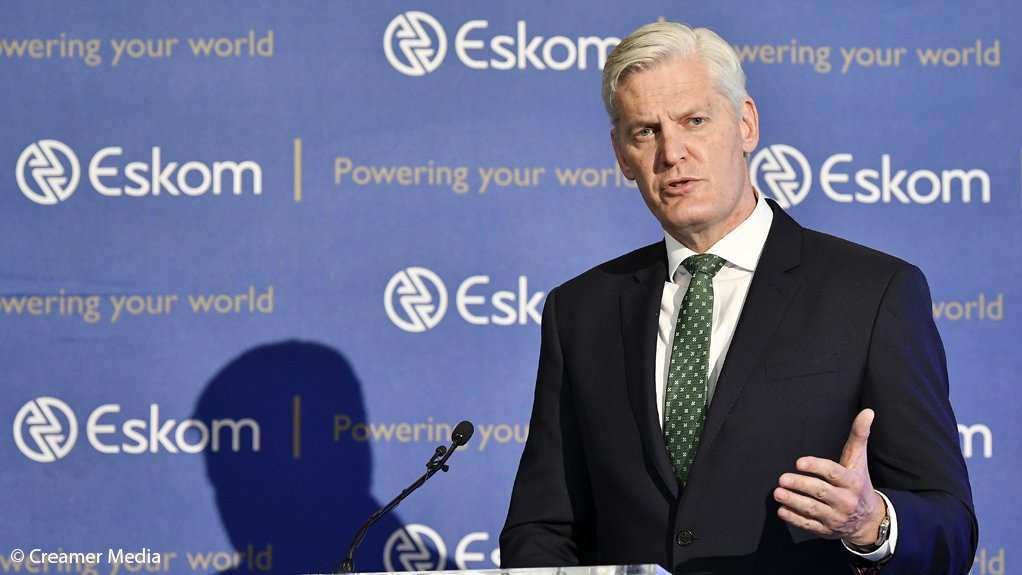Eskom aims to approach the market imminently with an offer to buy up to 1 000 MW of surplus electricity that it believes could be immediately available from existing independent power producers (IPPs) and large companies with their own generation capacity, such as Sasol and Sappi.
CEO André de Ruyter reported on Sunday that Public Enterprises Minister Pravin Gordhan had given the utility permission to approach the market on an urgent basis, but he also indicated that the proposed purchases had not been canvassed with or approved by the National Energy Regulator of South Africa (Nersa), which will host public hearings this week on Eskom’s request for a 32% tariff hike in 2023.
Speaking at a briefing to explain Eskom’s decision to declare, in the early hours of Sunday morning, Stage 6 load-shedding, De Ruyter said that the utility would approach the market on the basis of a dynamic-pricing model, whereby it would contract with suppliers at rates that were competitive with its “highest cost alternative”.
Currently, the utility’s most expensive production arises from the diesel-fuelled open cycle gas turbines (OCGTs), which are being used at high capacity factors to close gaps being left by the poorly performing coal fleet and the prolonged unavailability this year of Koeberg Unit 2, which had tripped again following a recent extended maintenance.
“So, when our coal fired units return to stability and our marginal cost goes down, then the market price that we are willing to offer would also go down commensurately,” De Ruyter explained.
“We want to make use of a dynamic market to, on a daily basis, fix prices from a number of suppliers, so that they also can do their calculations to see if it is worth their while to supply power into the grid.”
Overall, the model should result in prices below that of producing OCGT electricity, the cost of which has surged materially this year in line with the higher diesel prices that have emerged following Russia’s invasion of Ukraine.
For the year-to-date, Eskom has spent more than R7.7-billion to buy diesel and has a remaining budget for the year to March of only about R500-milion.
However, COO Jan Oberholzer indicated that, given the state of the coal fleet, he expected Eskom’s expenditure on diesel for the remainder of the financial year to probably double from the amount spent year-to-date.
Board and shareholder approval had been secured for the buying of any surplus electricity in line with an announcement made by President Cyril Ramaphosa on July 25, when he said Eskom would be empowered to approach industrial companies, IPPs and countries in the region with any immediately available generation capacity as part of a broader package of interventions to tackle intensifying load-shedding.
“We had an urgent board meeting yesterday, with Minister Gordon in attendance, and we discussed further steps to be taken.
“Tomorrow we will be approaching the markets to procure whatever megawatts are available on an urgent basis.
“We think that we can get about 1 000 MW from available generation capacity that we can tap into,” De Ruyter said.
While not all of that surplus was immediately available, Eskom had a high degree of confidence that it could procure more from the existing renewables IPPs, whose contracts disallowed them from selling surplus energy into the grid.
De Ruyter said that given the urgency, Nersa had not been approached regarding the proposal.
“I think it is something that we will address with Nersa once we have emerged out of this crisis.”
BEYOND STAGE 6?
Meanwhile, both De Ruyter and Oberholzer stressed that the risk of intensive load-shedding remained for the coming week, owing to ongoing breakdowns across the coal fleet.
While Eskom was hoping not to sustain Stage 6 beyond the Sunday night peak, De Ruyter acknowledge that there was a risk currently that even Stage 6 could be breached for the first time, owing to the unpredictability of the fleet.
The load-shedding schedule currently caters for up to Stage 8, or 8 000 MW of rotational cuts, after which the System Operator would have to issue directives to municipalities for even higher cuts so as to avoid the system declining into a total blackout, from which it would take weeks to recover.
Over the last week more than 45 units had tripped, while 42 units tripped in the previous week, precipitating the current round of load-shedding.
De Ruyter stressed, however, that there was no intention to defer planned maintenance, which had been ramped up recently to above 7 000 MW as the summer maintenance season kicked in.
“We do not wish to repeat the mistakes of the past by deferring planned maintenance.
“Also, once a unit has been taken off, and it has been opened up for planned maintenance, to return it to service before the maintenance has been completed, doesn't make much sense.
“So that is going to be our approach: we want to continue with planned maintenance, and we believe that compromising on that right now, we will again kick the can down the road and cause even greater difficulties further down the line.”
Acting generation GM Rhulani Mathebula also stressed that Eskom believed that the quality of the general overhauls was on an improving trend, indicating that of the ten units that recently underwent major “philosophy maintenance” eight were operating to expectation.
However, the post-maintenance performance of Koeberg Unit 2 and Duvha Unit 2 had been problematic, with both units still currently not operating.
Koeberg Unit 2, De Ruyter stressed, would only be returned to service once there was full confidence, in consultation with Framatome, that it could be returned safely.
EMAIL THIS ARTICLE SAVE THIS ARTICLE ARTICLE ENQUIRY
To subscribe email subscriptions@creamermedia.co.za or click here
To advertise email advertising@creamermedia.co.za or click here











